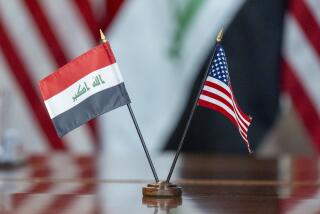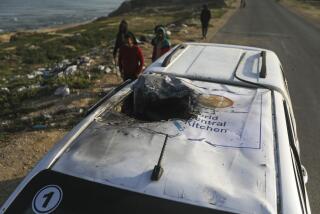Suicide Bomber Suspected in Mosul Blast
BULLETIN
WASHINGTON (AP) -- Gen. Richard Myers says the explosion that killed 22 people at a U.S. base in Iraq probably was caused by a suicide bomber.
BAGHDAD — One day after a powerful explosion tore through a mess tent at a U.S. military base near the northern Iraqi city of Mosul, about 50 people — most of them U.S. soldiers — arrived today at a medical hospital in Germany.
The wounded were flown to Ramstein Air Base, and taken to nearby Landstuhl Regional Medical Center. Officials believed eight of them to be in critical condition.
The explosion killed at least 22 people and wounded 66, including U.S. and Iraqi soldiers and civilian contractors. Fourteen U.S. troops were among the dead, military officials said today, putting the attack among the deadliest single incidents for the American military in Iraq since the invasion of March 2003.
A reporter for the Richmond Times-Dispatch who was at the base said the blast threw soldiers off their chairs and into a jumble of bloodied lunch trays, upturned tables and shrapnel. Panicked troops fled the large tent and dived for cover in concrete bunkers outside.
The cause of the blast was under investigation, but early indications pointed to a rocket attack, U.S. officials said. Photographs showed sunlight streaming through a massive hole in the top of the tent as soldiers carried out the wounded. One distraught soldier stood solemnly over a black body bag.
“It’s a sad day in Mosul,” said Brig. Gen. Carter F. Ham, who oversees 8,500 U.S. troops in the city. “But as they always do, soldiers will come back from that and they will do what they can do best to honor those who have fallen today.”
The attack came a day after President Bush painted a sobering picture of the situation in Iraq, saying at a Washington news conference that insurgent attacks were eroding the morale of Iraqis and Americans and that efforts to train Iraqi troops had had only “mixed” results.
On Tuesday, the president visited wounded troops at Walter Reed Army Medical Center in Washington and expressed condolences to relatives of service members killed in Mosul.
“Today, we had a rocket attack that took a lot of lives,” Bush said. “Any time of the year is a time of sorrow and sadness when we lose a loss of life. This time of year it’s particularly sorrowful for the families as we head into the Christmas season. We pray for them.”
In a statement on an Islamic website, the militant group Ansar al Sunna Army claimed responsibility for the strike, calling it a “martyrdom” operation, which usually means a suicide attack. The claim could not be verified.
U.S. officials downplayed suggestions that the blast was the work of a suicide bomber, saying they believed the weapon used was a 122-millimeter rocket. Such rockets have a range of up to several miles, military experts say.
Ansar al Sunna, which has links to Al Qaeda and Jordanian-born militant Abu Musab Zarqawi, has claimed responsibility for other deadly attacks in northern Iraq, including the killings of 12 Nepalese hostages in August and twin suicide bombings in Irbil in February, when men wearing explosives-laden vests killed more than 100 people.
Tuesday’s attack caught soldiers at one of their most vulnerable points. Military dining facilities are often soft-sided tents, and meals are one of the few times that troops congregate in large groups. The facility in Mosul was equipped to seat several hundred soldiers, who usually remove their helmets and flak jackets and rest their guns on the floor while they eat.
It was unclear whether the attackers were targeting the facility or struck it by accident. U.S. bases are routinely hit with mortar rounds and rockets. Last month, a mortar attack on a Mosul base killed two U.S. troops. But such projectiles frequently miss their targets and land without causing damage or injury.
“It very well may have been a lucky hit,” said Lt. Col. Steve Boylon, a military spokesman. “Even enemy forces get lucky.”
He added, “You can’t harden every building in a base environment. It’s impossible.”
Bill Nemitz, a columnist with Maine’s Portland Press Herald newspaper who is on assignment with the troops in Mosul, told CNN that he had heard “a lot of discussion” about the vulnerability of the tent. The military reportedly was constructing a concrete and steel dining hall to replace the tent.
If investigators determine that a bomb was planted in the tent or suicide attackers infiltrated the base, the incident will raise even more serious questions about the security at U.S. military installations.
Besides housing several battalions of the 25th Infantry Division, based at Ft. Lewis, Wash., the 276th Engineer Battalion from Richmond, Va., and a unit of Maine Army National Guard, the camp also is a training facility for the Iraqi national guard. Known as Forward Operating Base Marez, the camp is just south of Mosul.
In addition to the 15 soldiers, U.S. military officials in Baghdad said, five U.S. civilian contractors and two Iraqi soldiers were killed.
There was some confusion over the death toll. Although some military officials said 22 people were killed, others put the total at 24. A spokeswoman for Houston-based Halliburton Co., whose KBR subsidiary operates the dining facility, said that seven of its workers — four employees and three subcontractors — were killed.
“These brutal attacks are unsettling, appalling and very sad for everyone,” said Wendy Hall, the Halliburton spokeswoman. “We are doing everything we can to assist the people on the ground. Civilian contractors work side by side with the military and Iraqi people. Our work is difficult and in a dangerous environment and we are deeply saddened by this situation.”
Hall said 62 employees of Halliburton and its subcontractors have been killed in Iraq and Kuwait since the war began.
Mosul was also the site of the most-deadly incident involving U.S. troops in Iraq. In November 2003, two Black Hawk helicopters crashed over the city, killing 17 soldiers.
Security in Mosul, Iraq’s third-largest city, has deteriorated rapidly in recent weeks. After the U.S. invasion of the insurgent stronghold of Fallouja in November, rebels fled to once-peaceful Mosul, attacking police stations and killing scores of civilians with car bombs and mortar attacks. Dozens of bodies have been found in the city in the last month.
On Friday, masked gunmen ambushed a carload of Turkish policemen in Mosul, dragging them from their vehicle and shooting them. One victim was beheaded in the street.
“Mosul is a mixture of lawlessness,” Iraq’s interim prime minister, Iyad Allawi, said Monday during a round table with reporters in Baghdad.
He said Iraqi security forces were preparing to “clear” the city in cooperation with Iraqi Kurdish militia troops.
Allawi spent part of Tuesday playing host to British Prime Minister Tony Blair, who made a surprise visit to Baghdad in an effort to bolster support for the Jan. 30 election of a transitional national assembly. Blair called the violence in Iraq a “battle between democracy and terror,” and predicted that balloting next year would restore peace to the country.
But he also acknowledged that he could “feel the sense of danger” in Iraq as he arrived. Blair and Allawi predicted that violence would continue until the election.
As part of an apparent campaign to disrupt the vote, insurgents killed 65 people in twin car bombings Sunday in the cities of Najaf and Karbala, south of Baghdad.
In Washington, Secretary of State Colin L. Powell said that the attack Tuesday would not diminish the United States’ determination to support Iraq’s first free election in half a century or its efforts to defeat the insurgency.
“Even though we are saddened by the loss of these brave young Americans and others, we can’t be deterred and we can’t let [the insurgents] succeed,” Powell said to a group of about 40 reporters at a lunchtime meeting. “So we will continue to press on and use all the resources at our disposal to defeat this insurgency so that we can have the election on the 30th of January.”
Powell said the U.S. would continue to build a new Iraqi army that was to take over greater responsibility for the country’s security, but made clear it was a task that would require time. He said fielding a division of Iraqi troops (10,000 to 20,000 soldiers) that could perform at roughly the same level of efficiency as those in the U.S. Army would take up to 18 months.
“There should be no illusion that suddenly the day after the election that the Iraqis are going to be able to take over their own security,” Powell said. “I think that certainly we’re going to be there through ’05 in significant numbers.”
Times staff writers Mark Mazzetti, Doyle McManus, Tyler Marshall and T. Christian Miller in Washington and Daryl Strickland in Los Angeles contributed to this report.
More to Read
Sign up for Essential California
The most important California stories and recommendations in your inbox every morning.
You may occasionally receive promotional content from the Los Angeles Times.










